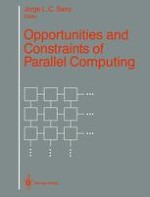1989 | OriginalPaper | Buchkapitel
A Case for Randomized Parallel Algorithms
verfasst von : John H. Reif, Sandeep Sen
Erschienen in: Opportunities and Constraints of Parallel Computing
Verlag: Springer US
Enthalten in: Professional Book Archive
Aktivieren Sie unsere intelligente Suche, um passende Fachinhalte oder Patente zu finden.
Wählen Sie Textabschnitte aus um mit Künstlicher Intelligenz passenden Patente zu finden. powered by
Markieren Sie Textabschnitte, um KI-gestützt weitere passende Inhalte zu finden. powered by
Randomization was formally introduced by Rabin[6] and independently by Solovay & Strassen[8] as a tool for improving the efficiency of certain algorithms. In a nutshell, a randomized algorithm uses coin-flips to make decisions at different steps of the algorithm. Therefore a randomized algorithm is actually a family of algorithms where each member of this family corresponds to a fixed sequence of outcomes of the coin-flip. Two of the most commonly used forms of randomization in literature are the Las Vegas algorithms and Monte Carlo algorithms. The former kind ensures that the output of the algorithm is always correct — however only a fraction (usually greater than 1/2) of the family of algorithms halt within a certain time bound (as well as with respect to some other resources like space). In contrast, the Monte Carlo procedures always halt in a pre-determined time period; however the final output is correct with a certain probability (typically > 1/2). This lends itself very naturally to decision algorithms (Rabin’s primality testing being a good example). For the purpose of this discussion we shall limit ourselves to the Las Vegas algorithms which have been more popular with the algorithm designers. For a general algorithm which produces more than just ‘yes-no’ output, the precise meaning of an incorrect output becomes subjective; for example we may need to know how close are we to the correct output in order to decide if the output is acceptable. Although, this is one of the reasons for bias towards Las Vegas algorithms, the use of either kind of algorithms depends on the particular application.
